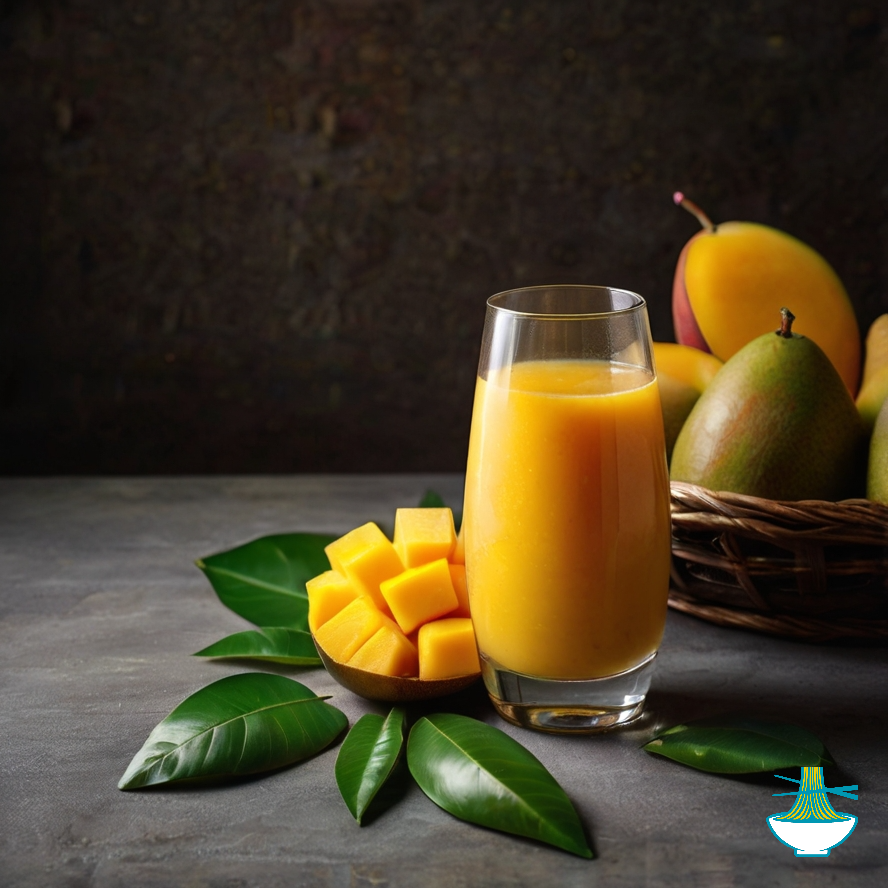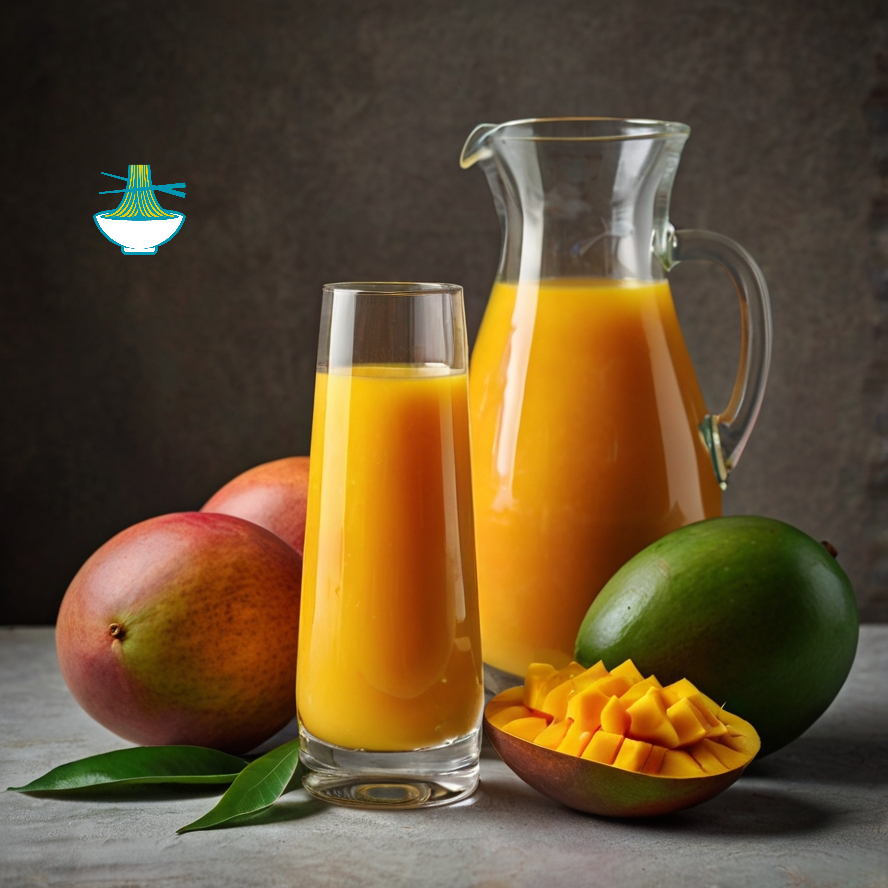Mango and Subia juice is a delightful and tropical combination, perfect for Ramadan. The natural sweetness of ripe mangoes blends beautifully with the creamy texture of Subia, a fermented barley or rice drink. Mangoes are rich in vitamins A and C, which are essential for immune health, skin care, and energy levels. Meanwhile, Subia provides a natural source of probiotics, supporting digestion and gut health. Together, these two ingredients create a refreshing and nutrient-packed drink that replenishes the body after a long day of fasting, offering hydration and essential vitamins.
Ingredients:
- 1 large ripe mango (peeled and chopped)
- 2 cups Subia (fermented barley or rice drink)
- 1 cup cold water
- 1-2 tbsp sugar (optional, adjust to taste)
- 1 tsp cardamom powder (optional for flavor)
Healthier Alternatives to Sugar
For those who are watching their sugar intake, especially people with diabetes or those following a low-sugar diet, there are several healthy alternatives to refined sugar in this recipe:
- Honey: A natural sweetener with a slightly floral flavor, honey can replace sugar and add additional antioxidants to the drink.
- Stevia: A zero-calorie sweetener that is derived from the leaves of the Stevia plant, it is ideal for those who need to manage their blood sugar levels.
- Agave Syrup: A sweetener derived from the agave plant, it has a lower glycemic index compared to sugar and can provide a mild sweetness without spiking blood sugar.
Instructions:
1. Prepare the Mango:
- Begin by selecting a ripe mango. For the best flavor, ensure the mango is soft but not overripe.
- Peel the mango with a sharp knife or vegetable peeler, removing the skin carefully.
- Cut the mango into small, manageable chunks. Discard the pit, ensuring you only use the flesh of the mango.
2. Blend the Mango and Subia:
- Place the chopped mango pieces into a blender or food processor.
- Add 2 cups of Subia (fermented barley or rice drink) to the blender. If you prefer a thicker consistency, you can add less Subia.
- Add 1 cup of cold water to help the blending process and achieve a smooth texture.
- Blend the mixture until it becomes smooth and creamy. If necessary, add a little more water to reach your desired consistency.
3. Sweeten (Optional):
- Taste the mixture and adjust sweetness as desired. You can add sugar to taste, but for a healthier option, try using alternatives like honey, stevia, or agave syrup.
- For an extra layer of flavor, add a pinch of cardamom powder to the blend. This will infuse the juice with a warm, aromatic flavor that pairs beautifully with the mango and Subia.
4. Serve:
- Once blended, pour the juice into glasses.
- If you prefer a chilled beverage, place the glasses in the refrigerator for 15-20 minutes to cool. Alternatively, serve immediately with ice cubes to enjoy a refreshing, cool drink.
- Garnish with mango slices or a few fresh mint leaves for added decoration and flavor.
5. Enjoy:
- Refresh yourself with this nutrient-packed, hydrating juice. Perfect for Ramadan, it will replenish your body and satisfy your taste buds after a long day of fasting.
Tips for Serving the Juice
To elevate the visual appeal and flavor of your Mango and Subia juice, here are a few creative serving ideas:
- Garnishing with Mango Slices: Adding thin slices of fresh mango to the glass not only enhances the flavor but also gives the juice a more elegant and refreshing look.
- Mint Leaves: Fresh mint leaves can be added for a burst of freshness, creating a delightful contrast to the rich creaminess of Subia and mango.
- Ice Cubes: Serve the juice with ice cubes to make it extra refreshing, especially on warm days or after a long day of fasting.
How Long Can the Juice Be Stored?
If you're preparing Mango and Subia juice in advance, it's important to store it properly to maintain its freshness:
- Shelf Life: The juice can be stored in an airtight container in the refrigerator for up to 2-3 days.
- Preserving Taste and Quality: To keep the juice fresh, avoid adding ice cubes until serving, as they can dilute the juice. It's best to consume the juice within the first 24 hours for the best taste and texture.
Comparison with Other Juices
- When compared to other popular Ramadan drinks, such as juices made with sugary syrups or artificial flavors, Mango and Subia juice stands out due to its natural sweetness, nutrient content, and health benefits. While traditional juices may be high in sugar and low in nutrients, the combination of mango and Subia offers vitamins, probiotics, and natural sugars, making it a healthier choice for those looking to stay energized and hydrated during Ramadan.
Frequently Asked Questions (FAQs)
- Can I use other fruits in this juice? Yes, you can substitute mango with other fruits like oranges or strawberries. However, using different fruits will change the flavor profile of the juice. For instance, oranges will provide a citrusy twist, while strawberries will add a sweet and tangy flavor. Both options still offer health benefits like vitamin C and antioxidants.
- Can I prepare the juice without sugar? Yes, you can make Mango and Subia juice without sugar. The natural sweetness of the mango and Subia is often sufficient. If you prefer extra sweetness, you can opt for natural sweeteners like honey or stevia, or simply adjust the amount based on your preference.
- What are the general benefits of Subia? Subia is a fermented drink that contains probiotics, which support gut health and digestion. It is also a good source of vitamins B6 and C, which contribute to immune health and skin vitality. Additionally, Subia is low in fat and can help keep you feeling full, making it a great choice for hydration during Ramadan.
- Can I use store-bought Subia or should I make it at home? Both store-bought and homemade Subia can be used in this juice. However, homemade Subia may offer a fresher taste and more control over the ingredients. Store-bought versions can vary in sweetness and consistency, so be sure to choose a high-quality product without excessive additives.
- How much juice should I drink daily to benefit from its nutrients? It’s recommended to consume one to two servings of Mango and Subia juice daily, especially during Ramadan. This amount will provide sufficient hydration and energy, while also offering digestive and immune support. If you are following a specific dietary plan, it is best to consult with a nutritionist to determine the appropriate amount based on your individual needs.

Nutritional Values and Benefits
Mango (per 100g)
- Calories: 60
- Carbohydrates: 15g
- Protein: 0.8g
- Fat: 0.4g
- Vitamins:Vitamin A: 54mcg (6% DV)
- Vitamin C: 36mg (60% DV)
Nutritional Benefit: Mangoes are an excellent source of vitamin C, supporting immune health and skin health. They also contain vitamin A, which is essential for vision and overall health. The fiber in mangoes promotes healthy digestion.
Subia (per 100ml)
- Calories: 60
- Carbohydrates: 12g
- Protein: 1g
- Fat: 0g
Nutritional Benefit: Subia is rich in probiotics, promoting gut health and digestion. It also provides fiber and vitamins B6 and C, which help with energy levels and immune health.
Sugar (per 1 tbsp)
- Calories: 50
- Carbohydrates: 13g
Nutritional Benefit: Sugar provides a quick source of energy, which is especially useful after fasting. It should be consumed in moderation.
Cardamom Powder (per 1 tsp)
- Calories: 5
Nutritional Benefit: Cardamom is known for its digestive benefits and anti-inflammatory properties. It also adds a warm, fragrant taste to the juice.
Benefits of Subia
Subia is not just a tasty drink; it is packed with health benefits that contribute to digestive health, skin health, and overall well-being.
1. Supports Digestion: Subia is rich in probiotics, which are beneficial bacteria that promote a healthy gut. These probiotics aid in digestion, help balance gut flora, and may reduce symptoms of bloating and indigestion.
2. Improves Skin Health: The fermentation process involved in making Subia enhances its nutritional profile, providing a source of vitamins like B6 and C, which are crucial for maintaining healthy skin. These vitamins support collagen production and protect the skin from damage.
3. Boosts Immune System: Subia is a natural source of vitamins that can help strengthen the immune system. Its rich content of vitamin C is particularly important for boosting immunity, especially during the fasting hours of Ramadan.
The Benefits of Mango in Ramadan
- Mangoes are packed with vitamins, antioxidants, and natural sugars, making them a perfect food to consume during Ramadan. After fasting all day, the body needs hydration and a quick source of energy, and mangoes deliver both. Their high water content helps hydrate the body, while the natural sugars provide a quick energy boost. Additionally, the vitamin C in mangoes supports the immune system, which is essential during the fasting period when the body may be more vulnerable to illnesses.


Comments